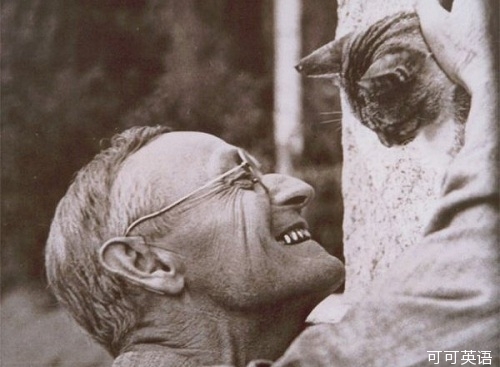(单词翻译:单击)
名著阅读
After an hour, since no sleep had come over his eyes, the Brahman stood up, paced to and fro, and left the house. Through the small window of the chamber he looked back inside, and there he saw Siddhartha standing, his arms folded, not moving from his spot. Pale shimmered his bright robe. With anxiety in his heart, the father returned to his bed.
After another hour, since no sleep had come over his eyes, the Brahman stood up again, paced to and fro, walked out of the house and saw that the moon had risen. Through the window of the chamber he looked back inside; there stood Siddhartha, not moving from his spot, his arms folded, moonlight reflecting from his bare shins. With worry in his heart, the father went back to bed.
And he came back after an hour, he came back after two hours, looked through the small window, saw Siddhartha standing, in the moon light, by the light of the stars, in the darkness. And he came back hour after hour, silently, he looked into the chamber, saw him standing in the same place, filled his heart with anger, filled his heart with unrest, filled his heart with anguish, filled it with sadness.
And in the night's last hour, before the day began, he returned, stepped into the room, saw the young man standing there, who seemed tall and like a stranger to him.
"Siddhartha," he spoke, "what are you waiting for?"
"You know what."
"Will you always stand that way and wait, until it'll becomes morning, noon, and evening?"
"I will stand and wait.
"You will become tired, Siddhartha."
"I will become tired."
"You will fall asleep, Siddhartha."
"I will not fall asleep."
"You will die, Siddhartha."
"I will die."
"And would you rather die, than obey your father?"
"Siddhartha has always obeyed his father."
"So will you abandon your plan?"
"Siddhartha will do what his father will tell him to do."
The first light of day shone into the room. The Brahman saw that Siddhartha was trembling softly in his knees. In Siddhartha's face he saw no trembling, his eyes were fixed on a distant spot. Then his father realized that even now Siddhartha no longer dwelt with him in his home, that he had already left him.
The Father touched Siddhartha's shoulder.
"You will," he spoke, "go into the forest and be a Samana. When you'll have found blissfulness in the forest, then come back and teach me to be blissful. If you'll find disappointment, then return and let us once again make offerings to the gods together. Go now and kiss your mother, tell her where you are going to. But for me it is time to go to the river and to perform the first ablution."
He took his hand from the shoulder of his son and went outside. Siddhartha wavered to the side, as he tried to walk. He put his limbs back under control, bowed to his father, and went to his mother to do as his father had said.
As he slowly left on stiff legs in the first light of day the still quiet town, a shadow rose near the last hut, who had crouched there, and joined the pilgrim--Govinda.
过了一个钟头,这个婆罗门睡不着便又爬起来,在房间里踱来踱去,然后走出了房子。他透过小窗往屋里瞅,看见席特哈尔塔仍站在那儿,交叉着双臂,一动不动,浅色上衣映出了淡淡的光。父亲心里很不安地回到了他的床上。
又过了一个钟头,这个婆罗门仍无睡意,便又爬起来,在房间里踱来踱去,然后走到了房子前面,看见月亮已经升起。他透过小窗往屋里瞅,看见席特哈尔塔仍站在那儿,一动不动,两臂交叉,月光照亮了他的光光的小腿。父亲又忧心忡忡地摸回到自己的床铺。
再过一个钟头,他又起来了一次;再过两个钟头,他又重复了一遍。他透过小窗看见席特哈尔塔仍站在月光中,站在星光下,站在夜暗里。一个又一个钟头过去了,他默默地往屋里瞅,看见站立者依然一动不动。他心里充满了恼怒,充满了不安,充满了犹豫,充满了痛苦。
在天亮之前的最后一小时里,他折回来,走进了房间,看见年轻人仍站在那儿,觉得他忽然长大了,但是也好像陌生了。
“席特哈尔塔,”他说,“你还在等什么?”
“你知道。”
“你就这么一直站着,等到天亮,等天中午,等到晚上吗?”
“是的,我就这么站着等。”
“你会累的,席特哈尔塔。”
“是的,我会累。”
“你会睡着的,席特哈尔塔。”
“我不会睡着。”
“你会死的,席特哈尔塔。”
“是的,我会死。”
“你宁可死掉,也不听父亲的话么?”
“席特哈尔塔总是听父亲的话。”
“那么,你愿意放弃自己的打算么?”
“席特哈尔塔会按父亲的吩咐去做。”
第一缕晨光照进了房间。婆罗门父亲看到席的两膝在微微颤抖。在席特哈尔塔的脸上见不到颤拌,他的眼睛注视着远方。这时,父亲意识到席特哈尔塔已不在自己身边,不在家乡,他已经离开了父亲。
父亲抚摩着席特哈尔塔的肩膀。
他说:“你要走进森林去当一个沙门了。如果你在森林里找到了永恒的幸福,就回来教给我。如果你得到的只是失望,就回来重新跟我们一起敬奉神灵。去吧,去吻别你母亲,告诉她你去哪儿。至于我,现在该是去河边第一次沐浴的时候了。”
他从儿子的肩上抽回手,出去了。席特哈尔塔打算移动步子,可是身子朝旁边晃了一下。他强迫自己向父亲鞠躬,然后就去见母亲,按照父亲的吩咐去向她道别。
当他在晨曦中迈开麻木僵硬的双腿,慢慢离开那依然寂静的城市时,从城市一家茅屋旁闪出一个蹲在那儿的人影,加入了朝圣的行列——那是戈文达。
背景阅读

本书简介:
古印度贵族青年悉达多英俊聪慧,拥有人们羡慕的一切。为了追求心灵的安宁,他孤身一人展开了求道之旅。他在舍卫城聆听佛陀乔答摩宣讲教义,在繁华的大城中结识了名妓伽摩拉,并成为一名富商。心灵与肉体的享受达到顶峰,却让他对自己厌倦、鄙弃到极点。在与伽摩拉最后一次欢爱之后,他抛弃了自己所有世俗的一切,来到那河边,想结束自己的生命。在那最绝望的一刹那,他突然听到了生命之河永恒的声音……经过几乎一生的追求,悉达多终于体验到万事万物的圆融统一,所有生命的不可摧毁的本性,并最终将自我融入了瞬间的永恒之中。
作者简介:
赫尔曼·黑塞(Hermann Hesse,1877.7.2-1962.8.9)德国作家。1923年46岁入瑞士籍。1946年获诺贝尔文学奖。1962年于瑞士家中去世。爱好音乐与绘画,是一位漂泊、孤独、隐逸的诗人。黑塞的诗有很多充满了浪漫气息,从他的最初诗集《浪漫之歌》的书名,也可以看出他深受德国浪漫主义诗人的影响,以致后来被人称为“德国浪漫派最后的一个骑士”。主要作品有《彼得·卡门青》、《荒原狼》、《东方之行》、《玻璃球游戏》等。
主要生平及创作
出生于德国西南部的小城卡尔夫的一个牧师家庭。自幼在浓重的宗教气氛中长大,1891年,他通过“邦试”,考入毛尔布隆神学校。由于不堪忍受经院教育的摧残,半年后逃离学校。这期间他游历许多城市,从事过多种职业。
在比较广泛地接受东西方文化熏陶之后,1904年,黑塞发表了长篇小说《彼得·卡门青特》,一举成名,从此成为专业作家。这一年他与玛丽结婚,移居巴登湖畔,埋头写作,1906年发表了长篇小说《在轮下》。这一时期的创作以浪漫主义诗歌、田园诗风格的抒情小说和流浪汉小说为主,作品洋溢着对童年和乡土的思念之情,充满对广大自然和人类的爱,同时也表现了青年人的精神苦闷与追求。
第一次世界大战后,黑塞的创作发生了明显的变化,他醉心于尼采哲学,求助于印度佛教和中国的老庄哲学,并对荣格的精神分析产生了深厚的兴趣。他试图从宗教、哲学和心理学方面探索人类精神解放的途径。这时期的长篇小说有《克努尔普》(1916)、《德米安》(1919)、《席特哈尔塔》(1922)、《荒原狼》(1927)和《纳尔齐斯与歌尔德蒙》(1930)等。这些书深受西方读者的喜爱,得到极高的评价,其中《荒原狼》曾轰动欧美,被托马斯·曼誉为德国的《尤利西斯》。
30年代后,法西斯在德国猖獗,黑塞对社会前途陷入深深的怀疑与绝望之中,但他仍不倦地从东西方宗教与哲学中寻求理想世界,《东方之行》(1932)、《玻璃球游戏》(1943)正是这一时期追求与探索的结晶。
黑塞被雨果·巴尔称为德国浪漫派最后一位骑士,这说明他在艺术上深受浪漫主义诗歌的影响。他热爱大自然,厌倦都市文明,作品多采用象征手法,文笔优美细腻;由于受精神分析影响,他的作品着重在精神领域里进行挖掘探索,无畏而诚实地剖析内心,因此他的小说具有心理的深度。1946年,"由于他的富于灵感的作品具有遒劲的气势和洞察力,也为崇高的人道主义理想和高尚风格提供一个范例",黑塞获诺贝尔文学奖。


